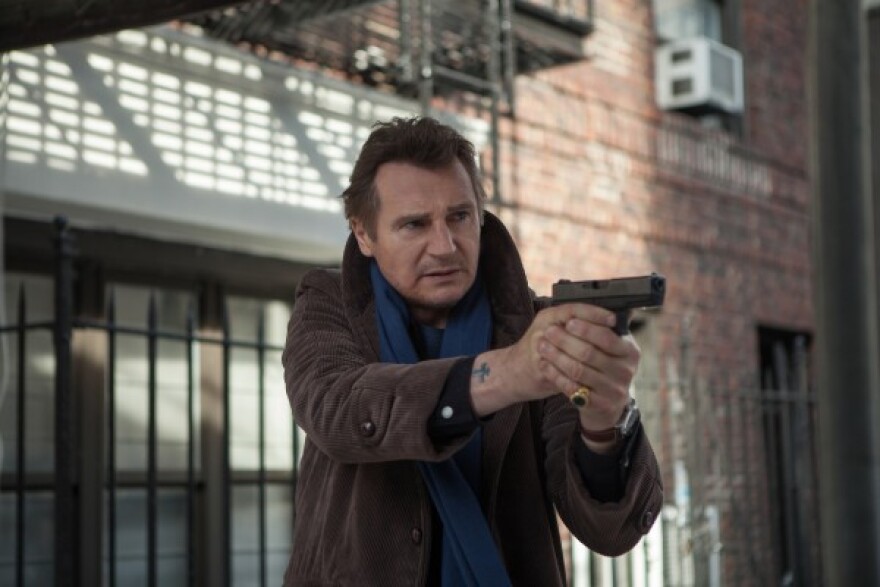A study from the Univ. of Pennsylvania's Annenberg Center says the people who rate films for the MPAA are becoming desensitized to violence; "Fury" rolls over the weekend box office; and a "Mad Men" actor goes back in time again.
A 'Mad Men' actor takes another step back in time
Actor Vincent Kartheiser plays Pete Campbell on TV’s “Mad Men,” but now that the hit show has taped its final season, Kartheiser has moved on to other projects. He’s currently playing filmmaker Billy Wilder in “Billy and Ray” — a play directed by Garry Marshall at the off-Broadway Vineyard Theater.
Rebecca Milzoff of our content partner, Vulture.com, recently caught up with Kartheiser at the theater.
Interview highlights
On the backstory to the play:
It’s about the writing of "Double Indemnity." It’s considered to be the first film noir, the first that got nominated for a lot of awards and brought a lot of attention to that type of film. Billy Wilder wrote it with Raymond Chandler and right before they started, Billy had a big falling out with his longterm writing partner, Charlie Brackett, so they brought in t[Chandler] who did mostly pulp novels and magazine short stories. And it’s really just the story of the blending of these two people’s careers — two people who worked very differently, had very different goals and ideals and theories. And how sometimes people who don’t get along so well make great partnerships.
On whether he was a Wilder fan before the project came to him:
I was, but it’s not like I called my agent and [said], “Find me a Billy Wilder play, I need to play him!” The script came my way and they said there was some interest in me, so I read it, and it intrigued me. I like all his movies, but it’s not like I’m a fanboy. It intrigued me to play someone who had such a big impression on film in its formative years. He’s a bit of Hollywood royalty, you know? I haven’t had a lot of experience playing people who were actual people. So it was also a kind of new daring experience for me in that way. Not that I’m doing an impression of Billy Wilder by any means. All the stock footage I could find is him as an older man, so I”m borrowing a little from that, but mostly I’m doing my own kind of take on the material. And the story was just really intriguing to me. There’s always interest in how movies get made; whenever people come to a set I’m working on, I kind of always love to watch the disappointment on their face. Making movies is not a very enjoyable experience — I mean, it’s not very titillating.
On working with Garry Marshall:
I had never met him before, which is amazing, because over the last three weeks we’ve realized he’s worked with everybody — everybody knows him. He does tell a lot of great storeis and part of his directing style is telling stories. I find it to be a very useful tool. He’ll come over to you and say, “I’ve got this story, I worked with this guy…” And you’ll realize, Oh, he’s telling me a clue as to what’s going on in this moment with my character. So it’s kind of a neat way of getting to know, cause it allows me to interpret in my own way. I can kind of perceive how the note manifests itself. And he’s wonderful also at just giving direct notes. Probably the biggest thing that drew me to this project was the opportunity to work with Garry — someone like him who understands comedy and how to tell stories so well, what makes something enjoyable. I don’t have a ton of experience doing comedy.
On whether he was surprised by anything he learned about Wilder:
I wouldn’t say there was something I was surprised about, but little kernels about his life have come up that gave it texture and gave me a clue as to what kind of person he was — all the while trying not to get too psychological on the play. I’ve always believed our job is really just to entertain. While "Double Indemnity" was being written, most of his family was still in Austria, some were in [concentration] camps. The whole time they were making the film he was trying to find out where his family was, trying to get them out of the country. But he was the kind of man who didn’t let people know those sorts of things. He was good at compartmentalizing things and he used his work as an escape from any sort of emotional issues that were going on. He did have some tragedies in his life. He lost his son — Vincent, actually, was his name. But he was the type of person who didn’t focus on that, he distracted himself.
On whether he's sporting a Billy Wilder haircut:
No, it’s funny — on "Mad Men," Pete’s a balding guy towards the end [of the series], so I was shaving my hairline. Then I get Billy Wilder and I go to look him up like, Hmm, what does Billy Wilder look like? And he’s balding! I’m like, They hired me because they think I’m balding! And I look nothing like this guy! But yeah, I think they kind of hinted, "Hey, would you mind shaving again?" And I [said], "You know, I like you guys a lot, but we’re gonna let the audience use their hairline imaginations."
"Billy & Ray" continues at the Vineyard Theater through Nov. 9.




